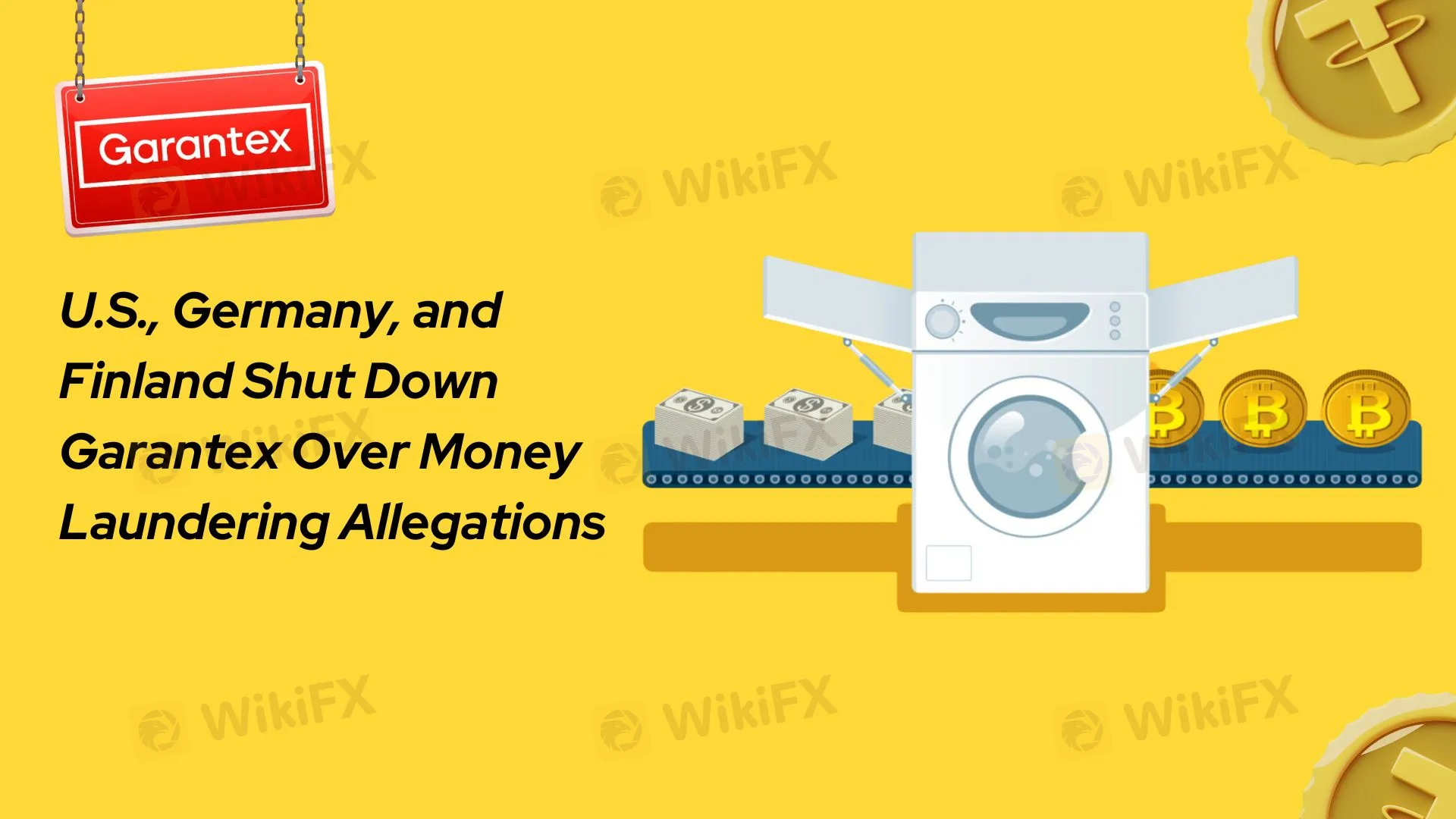简体中文
繁體中文
English
Pусский
日本語
ภาษาไทย
Tiếng Việt
Bahasa Indonesia
Español
हिन्दी
Filippiiniläinen
Français
Deutsch
Português
Türkçe
한국어
العربية
U.S., Germany, and Finland Shut Down Garantex Over Money Laundering Allegations
Abstract:The U.S., Germany, and Finland shut down Garantex over money laundering allegations, seizing its infrastructure, freezing assets, and blocking illicit transactions.

The United States, Germany, and Finland have taken coordinated action to shut down the cryptocurrency exchange Garantex over allegations of facilitating large-scale money laundering operations. The crackdown involved seizing Garantexs online infrastructure, freezing assets, and blocking transactions linked to illicit financial activities.
Garantexs Role in Money Laundering
Garantex, a Russian cryptocurrency exchange originally registered in Estonia in 2019, has been accused of processing at least $96 billion in cryptocurrency transactions, many of which were linked to ransomware, drug trafficking, and terrorist financing. According to the U.S. Department of Justice (DOJ), Garantex knowingly facilitated illicit financial flows and took measures to conceal its involvement.
Two key executives, Aleksej Besciokov (46, Lithuanian citizen, Russian resident) and Aleksandr Mira Serda (40, Russian citizen, UAE resident), have been charged with conspiracy to commit money laundering. Besciokov also faces additional charges of conspiring to violate U.S. sanctions and operating an unlicensed money transmitting business.
Court documents reveal that between 2019 and 2025, Besciokov and Mira Serda controlled Garantex, overseeing transactions and maintaining critical infrastructure. Despite being aware of illegal activities, they actively facilitated them and misled Russian law enforcement authorities about the identity of account holders linked to criminal activities.
International Actions Against Garantex
Users who now visit these websites will see a law enforcement seizure notice, indicating that the sites have been taken down to prevent further use for money laundering and other illegal activities.
Meanwhile, law enforcement authorities in Germany and Finland have seized the servers used to operate Garantex. U.S. authorities have also obtained an early copy of Garantexs customer and accounting databases. Additionally, more than $26 million in funds suspected of being used for money laundering has been frozen by U.S. law enforcement agencies.
On March 6, 2025, U.S. law enforcement executed a court-approved domain seizure of three websites linked to Garantex:
• Garantex.org
• Garantex.io
• Garantex.academy
The United States had already sanctioned Garantex back in April 2022, accusing it of facilitating ransomware payments and dark web transactions. However, Garantex continued operating despite being aware of the sanctions, even redesigning its operations to evade detection.
The coordinated actions by the U.S., Germany, and Finland mark another significant crackdown on illicit financial activities in the crypto space.
Disclaimer:
The views in this article only represent the author's personal views, and do not constitute investment advice on this platform. This platform does not guarantee the accuracy, completeness and timeliness of the information in the article, and will not be liable for any loss caused by the use of or reliance on the information in the article.
Read more

Thinking of Investing? Read Must-Know Facts About Funding pips!
When you check the internet for Funding Pips, you'd be surprised to know it's filled with praise for Funding Pips but often lacks the real facts that traders need. Everything that seems too good to be true should always be verified first. It could be Fraud . So, we conducted research and collected several facts you must know about Funding Pips.

OctaFX Back in News: ED Attaches Assets Worth INR 134 Cr in Forex Scam Case
The Enforcement Directorate (ED) in Mumbai has attached assets worth around INR 131.45 crore. This included a luxury yacht and residential properties in Spain. Read this interesting story.

Truth About Angel One – Here’s What You Need to Know
Thinking about investing in Angel One? Wait! Know the essential things about the broker before Invest. It could be SCAM. Read, think, and invest .

He Thought He Earned RM4 Million, But It Was All a Scam
A retired teacher in Malaysia lost over RM838,000 after falling for a fake investment scheme that promised quick and high returns.
WikiFX Broker
Latest News
He Thought He Earned RM4 Million, But It Was All a Scam
CryptoCurrency Regulations in India 2025 – Key Things You Should Know
OctaFX Back in News: ED Attaches Assets Worth INR 134 Cr in Forex Scam Case
Trump inaugural impersonators scammed donors out of crypto, feds say
Ethereum is powering Wall Street's future. The crypto scene at Cannes shows how far it's come
Forex Hedging: Is It a Trader’s Safety Net or Just an Illusion?
US debt is now $37trn – should we be worried?
OPEC+ members agree larger-than-expected oil production hike in August
Dukascopy Ends EOS/USD Trading Amid Liquidity Issues
FIBO Group MT5 Cent Account with Ultra-Leverage up to 1:5000 for Beginners
Currency Calculator


